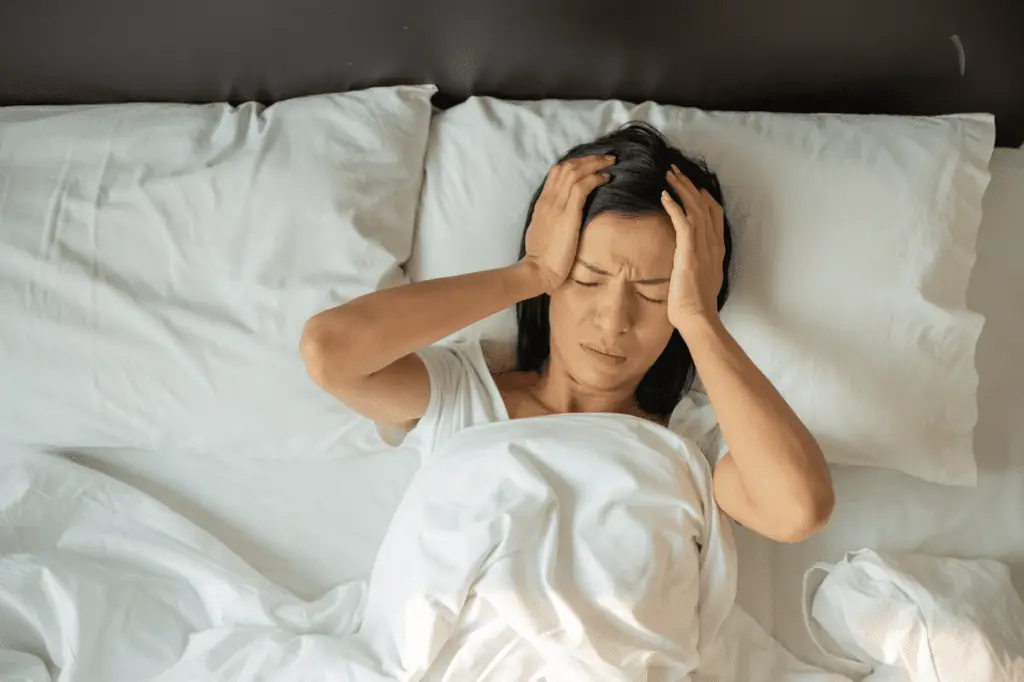
Have you ever felt like your heart is racing, your stomach is in knots, and your muscles are tense for no apparent reason? You’re not alone. Anxiety affects millions worldwide and is one of the most common mental health disorders. In fact, according to the World Health Organization, anxiety disorders affect 1 in 13 people globally. While anxiety is often associated with its impact on mental health, it can also significantly affect physical health.
In this article, we’ll explore how anxiety can manifest physically and impact our overall well-being. So, grab a cup of tea, take a deep breath, and let’s explore the physical effects of anxiety together.
What Is Anxiety
Anxiety is like a bully that creeps up on you when you least expect it. It’s that feeling of unease that makes your heart race, your palms sweaty, and your mind goes into overdrive. It’s the little voice in your head that whispers “what if” and makes you second-guess everything you do. In short, anxiety is a beast that can affect anyone, anywhere, at any time.
At its core, anxiety is a natural response to stress. It’s your body’s way of telling you that something is wrong and you need to pay attention. But when anxiety becomes chronic, it can wreak havoc on your physical health. From headaches to heart palpitations, anxiety can manifest in a variety of ways and take a serious toll on your body.
So let’s take a closer look at the five main ways anxiety can affect your physical health.
Increased Heart Rate And Blood Pressure
Anxiety is like a fire alarm that goes off in your body when there’s no actual fire. It triggers the “fight or flight” response. This natural biological response prepares our body to either fight off a threat or run away from it. When we experience anxiety, our brain perceives a threat and activates this response. This releases hormones such as adrenaline and cortisol, which prepare our body for action.
As a result, our heart rate increases to pump more blood to our muscles and organs. Our blood pressure rises to ensure that blood and oxygen are delivered where needed most. This response is meant to be temporary and is designed to help us deal with immediate danger.
However, when anxiety becomes chronic, the fight or flight response can be activated repeatedly, leading to prolonged periods of increased heart rate and blood pressure. This can put a strain on our cardiovascular system and increase the risk of developing heart disease or having a stroke.
Digestive Issues
Did you know that anxiety can even affect your digestive system? That’s right. Anxiety can cause a host of digestive issues that can leave you feeling uncomfortable and unwell.
When we experience anxiety, our body goes into “fight or flight” mode, releasing hormones that can affect our digestion. This can lead to various digestive issues, including stomach pain, bloating, and diarrhea. In fact, studies have shown that anxiety is a common trigger for irritable bowel syndrome (IBS).
IBS is a condition that affects the digestive system and can cause symptoms such as abdominal pain, bloating, and changes in bowel habits. While the exact cause of IBS is unknown, research has found a strong link between stress and anxiety and the onset of IBS symptoms.
When we’re feeling anxious, our body produces more stress hormones, which can cause the muscles in the digestive system to contract and spasm, leading to discomfort and pain. Additionally, anxiety can also affect the balance of bacteria in the gut, which can contribute to digestive issues.

Muscle Tension And Pain
Have you ever felt like your muscles are constantly tight or sore, even when you haven’t been working out? If so, it could be a sign of anxiety. That’s right. Anxiety can cause muscle tension and pain, which can be a real pain in the neck (and back, and shoulders, and everywhere else).
When we experience anxiety, our muscles tense up in preparation for action. However, when anxiety becomes chronic, this tension can become persistent, leading to muscle pain and discomfort.
This persistent muscle tension can also contribute to conditions. One of them is fibromyalgia, a chronic pain disorder characterized by widespread muscle pain and tenderness. While the exact cause of fibromyalgia is unknown, research has found a strong link between stress and anxiety and the onset of fibromyalgia symptoms.
It’s thought that the persistent muscle tension caused by anxiety can contribute to the development of fibromyalgia. This tension can lead to the development of trigger points, which are areas of the body that are particularly sensitive and painful.
Weakened Immune System
Do you ever feel like you’re constantly getting sick? You might want to take a closer look at your stress levels. Chronic anxiety can wreak havoc on your immune system, making it harder for your body to fight off illness and disease.
Think of your immune system like a superhero team. They’re ready to take on any villain (a.k.a. germs) that try to invade your body. But when chronic anxiety is in the picture, it’s like the supervillain has snuck into the superhero headquarters and started wreaking havoc. The superhero team is so busy dealing with the supervillain that they don’t have time to fight off the smaller villains (a.k.a, colds and flu).
In other words, chronic anxiety can weaken your immune system by diverting its attention away from fighting off illness and disease. This can leave you more susceptible to getting sick and can also make it harder for your body to recover when you do get sick.
Sleep Disturbances
Picture this: you’re lying in bed, ready to drift off into dreamland. But suddenly, your mind starts racing. You can’t shake off that nagging feeling of worry and fear. Your heart starts pounding, your palms get sweaty, and before you know it, you’re wide awake. Sound familiar?
If you suffer from anxiety, you’re probably no stranger to sleeping disturbances. Anxiety can make it incredibly difficult to fall, stay, or get enough quality sleep. And if you’re not getting enough sleep, your body will let you know.
Lack of sleep can impact your physical health in a number of ways. For starters, it can weaken your immune system, leaving you more susceptible to illness. It can also mess with your hormones, making it harder for your body to regulate things like appetite and metabolism. This can lead to weight gain, diabetes, and other health problems.
But that’s not all. Chronic sleep deprivation can also take a toll on your mental health. It can leave you feeling irritable, moody, and stressed out. And over time, it can even contribute to the development of anxiety and depression.

Managing Anxiety
Anxiety can take a serious toll on your physical health, but the good news is that there are plenty of ways to manage it. And no, you don’t have to sit in a dimly lit room meditating for hours on end (unless that’s your thing, of course). Here are some techniques to get you started:
Exercise
Physical activity is one of the best ways to reduce anxiety and improve overall health. Exercise releases endorphins, which can help reduce stress and promote feelings of happiness. Whether it’s going for a walk, hitting the gym, or practicing yoga, find an activity you enjoy and make it a regular part of your routine.
Deep Breathing
Taking slow, deep breaths can help calm your nervous system and reduce feelings of anxiety. This technique is easy to do anywhere and anytime. Try inhaling for four counts, holding for four counts, and exhaling for four counts.
Progressive Muscle Relaxation
Progressive Muscle Relaxation is a technique that involves tensing and relaxing each muscle group in your body, one at a time. This can be done either lying down or sitting up straight.
It’s important to take deep breaths while doing this exercise so you don’t become dizzy or lightheaded. If you feel like your heart rate is increasing too much, stop the exercise and rest until it returns to normal.
Mindfulness
Mindfulness involves paying attention to the present moment without judgment. This can be done through meditation or simply by focusing on the sensations in your body. By staying present, you can help reduce anxiety and promote relaxation.
Journaling
Journaling is a great way to get your thoughts and feelings out of your head and onto paper. It’s also a great way to track your feelings over time. So, if things get better or worse, you can see the progress in black and white.
Supplements
Certain supplements can help reduce anxiety symptoms, such as ashwagandha, magnesium, and valerian root. Always speak with your healthcare provider before taking any new supplements.
Social Support
Spending time with friends and loved ones can be a great way to manage anxiety. Talking about your worries with someone you trust can help you feel less alone and more supported.
Talking about your feelings with someone else can also help reduce anxiety symptoms by allowing you to express what’s going on inside your head without feeling judged by others who may not understand what it feels like to live with this condition every day.

Bottom Line
Anxiety isn’t just a pesky little emotion that makes you feel a bit uneasy. It’s a full-blown physical ailment that can wreak havoc on your body. From digestive issues to heart problems, anxiety has a way of making itself known in the most unpleasant ways possible.
But fear not! There is a light at the end of the tunnel. Seeking professional help, practicing mindfulness, and making healthy lifestyle choices can all help to alleviate anxiety and improve physical health.